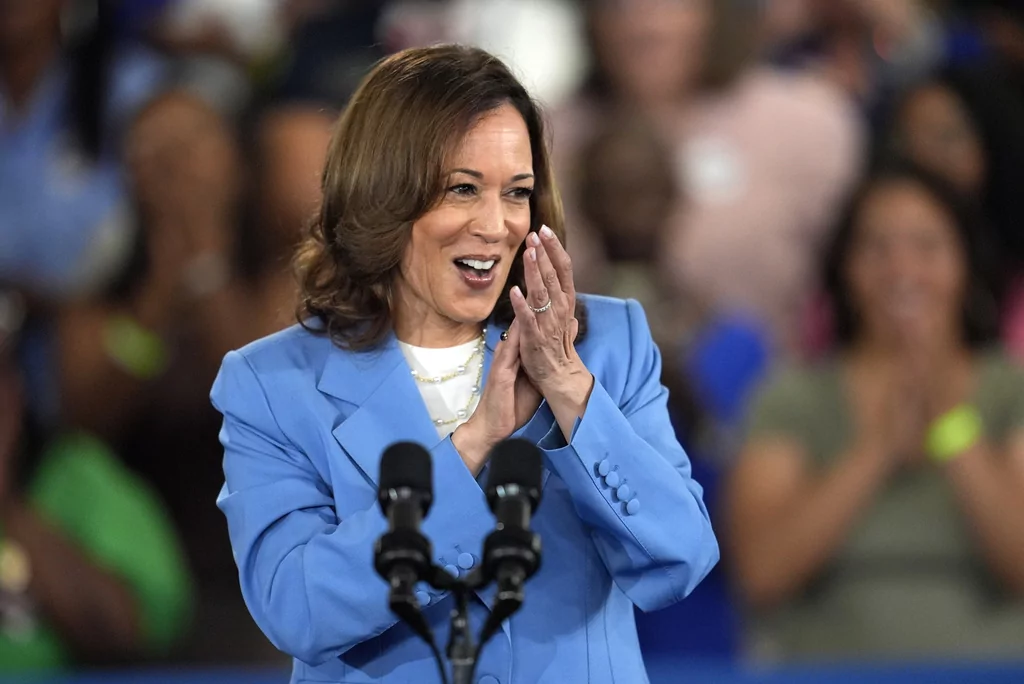

CHICAGO — Call it a tale of two Chicago Democratic National Conventions.
The 1968 party gathering in Illinois conjures up images of Chicago Police beating up hippies and other Vietnam War protesters in the streets outside of the International Amphitheatre. The divisive affair did little to help then-Vice President Hubert Humphrey, the Democratic presidential nominee who went on to lose narrowly that fall against Republican rival Richard Nixon.
Twenty-eight years later in Chicago, though, Democrats put on a much happier face. At the United Center, the same site where, on Thursday, Vice President Kamala Harris will officially accept the Democratic presidential nomination, Democratic faithful in 1996 danced in the aisles to “Macarena.” Delegates’ moves to the Latin-themed song, a Billboard topper at the time, were often awkward — and to this day periodically surface on the social media site X as memes. But it signaled Democrats’ good feelings at the time. Then-President Bill Clinton was easily on his way to securing a second term over Republican nominee Bob Dole, the former Senate majority leader.
Now, another 28 years after the last Democratic National Convention in Chicago, it’s an open question how much the event will boost the chances of Harris and her running mate, Gov. Tim Walz (D-MN). Democrats are generally united behind Harris as she tries to fend off a challenge from former President Donald Trump, the 2024 Republican nominee. But vocal anti-Israel elements of the Democratic coalition are angry at what they call one-sided support for the Jewish state by President Joe Biden — with Harris by his side in the White House.
Israel-hostile activists threaten to disrupt the happy face Democrats want to put on the convention, with planned protests outside of the United Center. The protests will, in a sense, continue and likely ratchet up efforts that began almost immediately after the Oct. 7, 2023, terrorist attack on southern Israel, killing about 1,200 people, with hundreds more taken hostage. Israel’s defensive war in response has resulted in thousands of civilian casualties, a result of the Hamas strategy to use Gaza residents as human shields.
The looming protests threaten the convention’s emphasis on a seamless hand-off to Harris, 59, by Biden, 81 who bowed out of running amid pressure by fellow Democrats concerned about voters’ negative reaction to his continued White House tenure at such an advanced age.
Expect to see the anti-Israel protests outside the United Center a major part of news coverage, said Talmage Boston, author of the 2024 book How the Best Did It: Lessons From Our Top Presidents.
“I think it will be more like 1968,” Boston said in an interview. “All these anti-Israel, pro-Palestinian groups are all going to Chicago and are going to be marching. That’s a lot of people. Inside the convention building, I think it’s going to be a coronation, and everybody’s locked arms, with a sense of unity, etc.”
There’s a key difference from the 1968 outdoor protests when much of the nation had turned against the war in Vietnam, added Boston, a Dallas-based attorney who has practiced at law firms in Texas since the late 1970s. Now, most mainstream Democrats are still pro-Israel, to one degree or another.
That makes for a serious party split.
“This is different — most Americans do not support the cause for which these protesters are advocating,” Boston said. “I would be shocked if there’s not some major conflict. I don’t think it’s going to be calm overall.”
Still, the convention, even with inconvenient protests outside of the United Center, could give the Harris-Walz ticket a boost, building off the momentum they’ve seen in swing state polls of late, said Brian Rosenwald, a political historian at the University of Pennsylvania.
“I think you’re going to have fewer problems than if Biden had stayed on the ticket,” Rosenwald said in an interview. “Also, for Harris, the Left is willing to cut her a bit more slack on the Middle East. Since she’s not the decision-maker, and she’s blurred her views a bit more on it.”
More broadly, “This is her chance to reintroduce herself,” Rosenwald said. “Harris has a real shot to put this race away. If she has as good a next month as she’s had this past month.”
Yet the flip side is that any mistake by Harris is likely to get compounded by the crunched nature of her 3 1/2-month presidential bid.
“There is some downside here,” Rosenwald said. “The compression of everything can create something of a political snowball.”
A chaotic 1968 and serene 1996
Whatever happens over the next few days, though, the ghosts of 1968 aren’t going away. The convention occurred in the shadow of President Lyndon Johnson’s March 31, 1968 announcement that he wouldn’t seek reelection. A few days later, civil rights leader Martin Luther King Jr. was assassinated. The Democratic race itself was upended two months later with the killing of New York Sen. Robert F. Kennedy, who, with Minnesota Sen. Eugene McCarthy, had helped drive Johnson from the race over Vietnam.
One of the most tumultuous conventions in history yielded some extraordinary television moments. CBS White House correspondent Dan Rather was caught in the middle of a scrum on the floor and was roughed up, telling anchor Walter Cronkite, who was stationed on a platform in the venue, “I’m sorry to be out of breath, but somebody belted me in the stomach.”
Cronkite replied, “I think we got a bunch of thugs here, Dan, if I may be permitted to say so. … Thank you, Dan, and pitching in there, despite every handicap that they can possibly put in our way from free flow of information.”
When Sen. Abraham Ribicoff of Connecticut gave a speech in favor of nominating George McGovern, his Democratic Senate colleague from South Dakota, he exclaimed, “With George McGovern as president of the United States, we wouldn’t have to have Gestapo tactics in the streets of Chicago … we wouldn’t have a National Guard [here]!” Cameras caught Chicago Mayor Richard J. Daley shouting expletives and insults at Ribicoff, who noted, “How hard it is … to accept the truth.”
In marked contrast to 1968, the 1996 DNC was essentially a recoronation of Clinton, who turned 50 that summer. He led throughout the race against Dole, then 73, in a generational battle. Dole, in 1996, had finally won the Republican nomination in his fourth bid for national office, but he never had much of a shot against Clinton, whose fiercest critics acknowledged his profound political skills.
Highlights of the 1996 convention included a speech by the late paralyzed actor Christopher Reeve on opening night, with Reeve speaking passionately about the Americans with Disabilities Act. On a lighter note, “Macarena” ruled the convention — then-first lady Hillary Clinton can be seen clapping enthusiastically, if a bit off-beat, in a clip that’s made the X rounds ahead of the 2024 Chicago Democratic National Convention.
Democratic delegates were even treated to the comedic stylings of then-Vice President Al Gore, who said, “This is some crowd. I’ve been watching you doing that Macarena on television. And if I could have your silence, I would like to demonstrate for you, the Al Gore version of the Macarena.” Gore then stood perfectly still, a deadpan expression on his face, before saying, “Would you like to see it again?”
CLICK HERE TO READ MORE FROM THE WASHINGTON EXAMINER
Even if those good feelings can be replicated, bad memories from 1968 are likely to hang over this convention.
“I thought from the beginning it was stupid to put it in Chicago,” said Rosenwald, the University of Pennsylvania political historian. “There would have been a marginal benefit to having it in a swing state. The images of 1968 are so indelible. Every time you got there, you run the risk of people looking back to that convention.”




